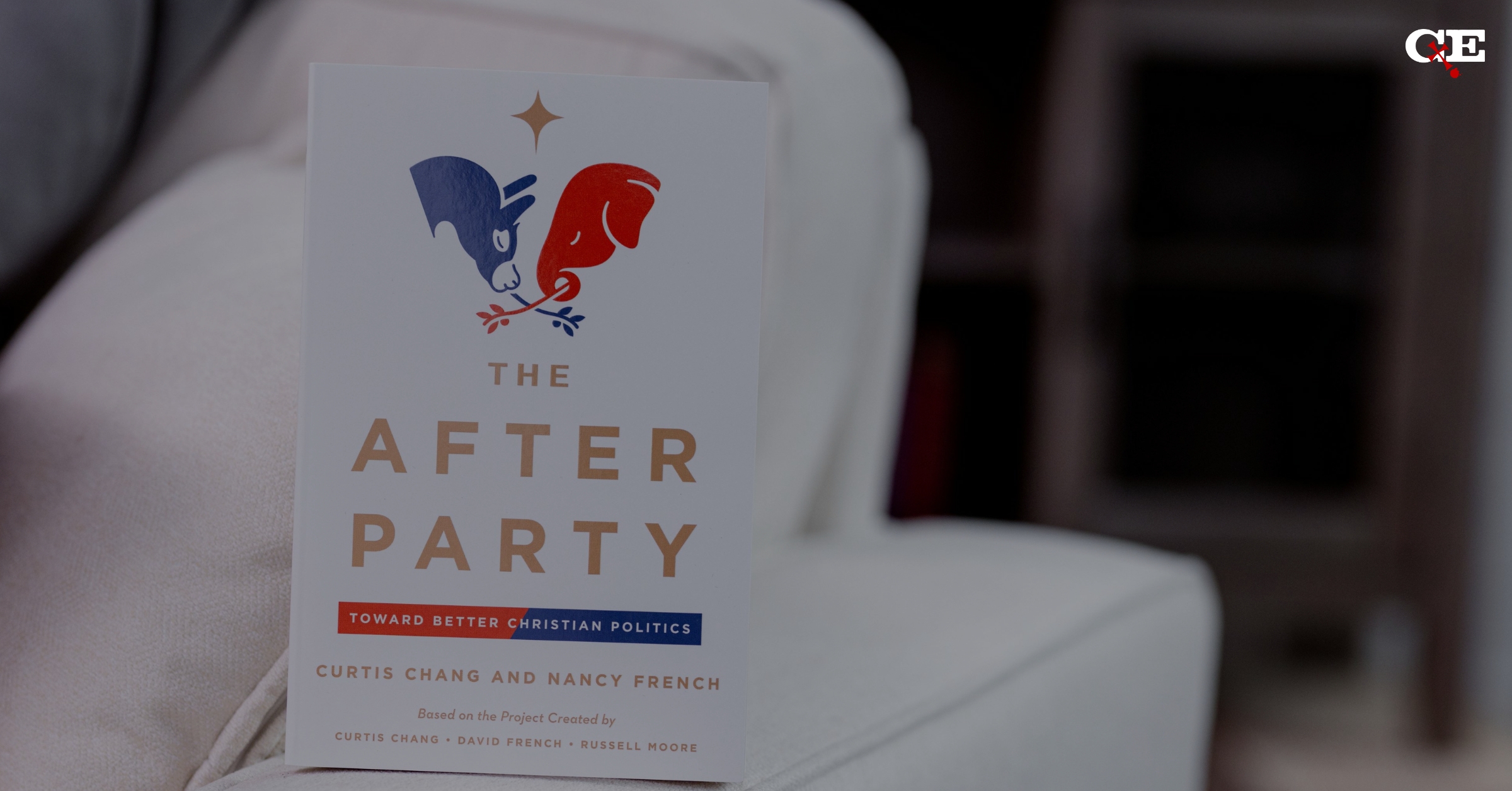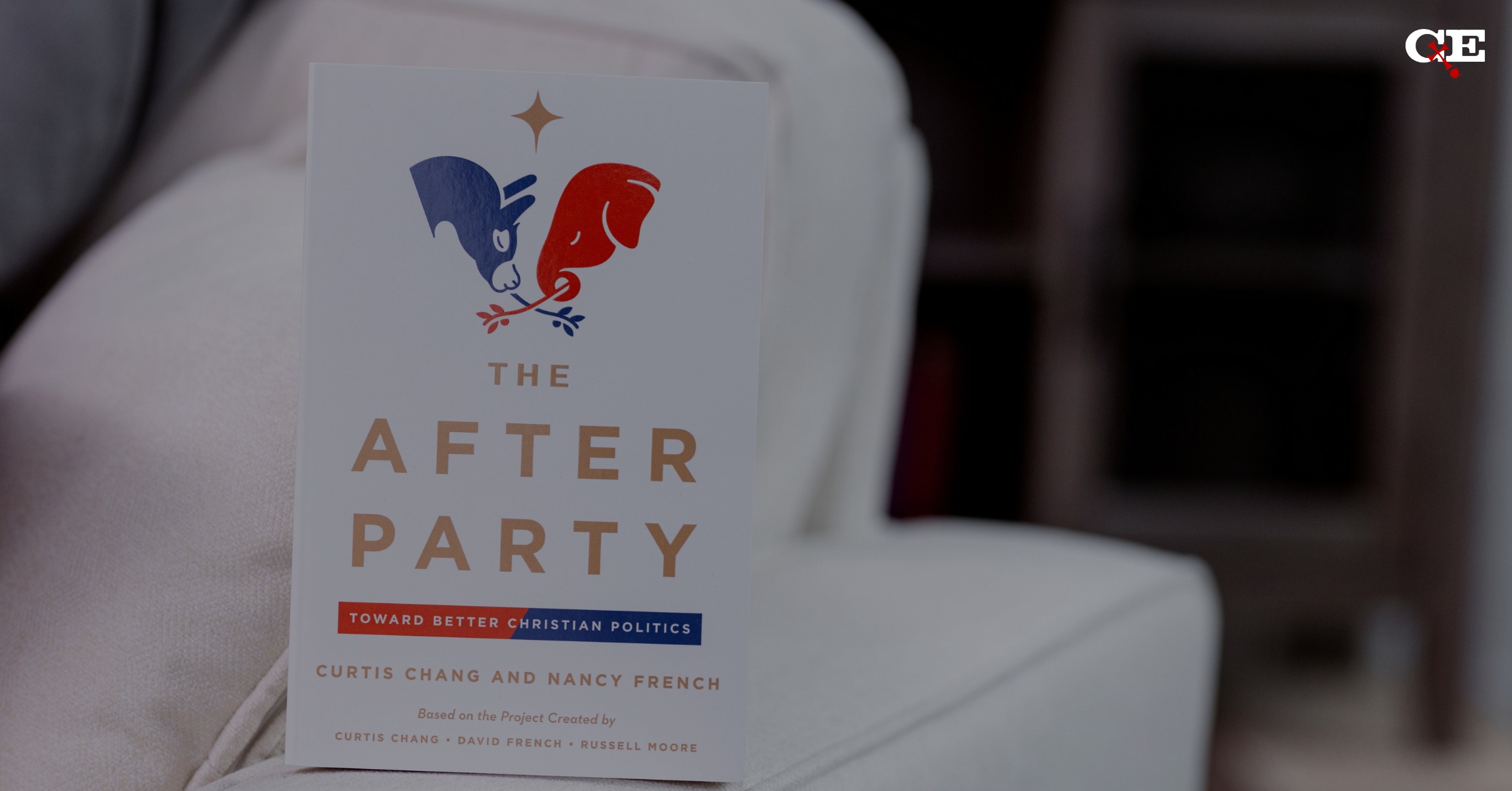For those who haven’t heard of it, The After Party (TAP) is a small group curriculum and corresponding book that is being heavily promoted this election year to individuals, churches, and Christian institutions (such as colleges) to counter the “dangerous trend” of evangelicals having their political identity formed by “partisan forces, not by true Biblical faith.”

What is The After Party Curriculum?
The curriculum was developed by David French (New York Times columnist), Russell Moore (Editor-in-Chief of Christianity Today), and Curtis Chang. Fewer people are familiar with Chang than with French and Moore, but for context, his most notable project was called “Christians and the Vaccine,” through which he led a national effort to convince Covid vaccine-resistant evangelicals that their “anxiety, distrust of institutions, and political polarization” was threatening the vaccine’s potential for “healing our world.”
Earlier this year, TAP made a lot of headlines when journalist Megan Basham published a First Things article detailing how the whole project was funded by hard-left foundations (“Follow the Money to The After Party”). Alisa Childers and I also did an episode on our Unshaken Faith podcast in February in which we discussed the inherent problems with progressives funding Christian curriculum (as well as other concerns about TAP).
Since then, I’ve heard from quite a few people with concerns that their church is rolling the curriculum out this fall. When they share Megan’s article or Alisa’s and my episode, some of these churches recognize the implications and change course. However, others have pushed back to say that we didn’t specifically address the content of the curriculum, only the funding. While I think the funding speaks for itself (listen to my recent podcast interview with Megan, in which we spend about 10 minutes discussing why), I want to now address—in depth—why the content itself is clearly problematic. It might seem peculiar that I would write my longest article ever on such a niche topic, but I hope that this level of detail will give pastors and concerned church members a better understanding of why this book should absolutely be avoided.
In particular, for purposes of this article, I’m evaluating the book specifically. While the book is not a necessary part of the small group curriculum, TAP creators say, “This paradigm-shifting book is designed to complement the course. Read it beforehand to discern if the course is a fit for your needs—or read it afterward to go deeper on a Jesus-centered approach to politics.” So, in their estimation, this is a deeper exploration of their approach and claims in the small group curriculum; if you agree that the book is problematic given what I say below, then the small group curriculum should be ruled out as well given their stated relationship.
What’s the Goal of TAP?
Before you can understand the key problems with TAP, it’s important to understand their stated goals. According to their website:
“The After Party is a collection of resources designed by the non-profit Redeeming Babel to help you move towards better Christian politics. Our video course, book, and worship music were designed for pastors & people who know there’s a better way to ‘do politics.’ As you engage with our materials, you’ll be equipped & encouraged to do the hard work of engaging across differences, reframe your political identity in light of the Gospel’s promises, and focusing your heart & mind on the ‘how’ of relating to each other before the ‘what’ of political opinions.”
Reading this description and other similar marketing language TAP uses, you might think it’s pretty innocuous. People can absolutely treat each other poorly in discussing politics, we’re in the middle of a particularly contentious election season, Christians need to have their identity first and foremost in Jesus, and it can be good to be reminded that how we engage does matter.
In fact, in going to their site right now to grab a link for this article, I was shown the following pop-up:
“We’d love to send you a free sample of our latest book to help you (perhaps!) reframe how you think about politics in light of biblical virtues like kindness, love, and mercy. It’s practical & full of hope—and we think you’ll like it!”
Again, this sounds great.
From TAP’s marketing, one would think this is simply a curriculum to help Christians think about charitable communication. The creators repeatedly claim it’s non-partisan and continually emphasize this is just about the “how”—something any church should be able to get behind, or so the story goes.
But, to be blunt, I believe this is highly disingenuous marketing given the content of the book. The marketing is designed to attract churches who would like to simply encourage charitable communication, but the execution is designed to convince Christians that they shouldn’t be so conservative.
The marketing is designed to attract churches who would like to simply encourage charitable communication, but the execution is designed to convince Christians that they shouldn’t be so conservative.
In fact, when you really see through what they’re saying in TAP—as I’ll demonstrate in a moment—it’s completely obvious why hard-left foundations funded it. Although TAP repeatedly said publicly that the funding source shouldn’t matter, any reasonable person should want to know why progressive non-Christian organizations would be interested in financing a church curriculum. TAP trivialized the importance of that question, but it’s easily answered when you read the book. Given the content, I could imagine TAP’s pitch to these progressive foundations sounding something like this:
“We, like you, despise Donald Trump. And we, like you, are greatly disturbed by how many Christians helped put him in power. But Christians still predominantly think that they should vote Republican regardless of who the candidate is—even if it’s a despotic threat like Trump. We believe that if we can get Christians to think that politics is more complex than they realize, that they can’t ever be certain that their view on a given subject aligns with what God thinks, and that being humble means seeing all political positions as equally viable for Christ followers . . . then we’ll see a weaker correlation with Christians and conservative positions over time. The key is to introduce these subjects using marketing language that’s nonthreatening and that every Christian should presumably agree on going into it—for example, that we should engage more graciously with one another. This curriculum would therefore be sold as the ‘how’ of doing politics, but in execution, we hope to weaken the Republican party’s hold on the church. Want to help us fund it?”
Yes, I’m reading into their motivations. But the rest of this long article will make my case for why I believe this is a fair characterization.
On a final note before we get into the details, church leaders and other Christians who think the hypothetical pitch above represents a worthy project will, of course, love TAP. This article isn’t for them. This article is for those churches who have been deceived by the marketing into thinking this is just a curriculum about better communication and would be gravely concerned to find out it’s actually going to confuse their members into believing there’s moral equivalence between the political parties. If you and/or your church leaders believe there is no moral equivalence on major issues such as abortion, gender ideology, neo-Marxist indoctrination in K-12 schools, and all the societal manifestations of identity politics, then you’ll want to stay far away from sowing the seeds of confusion this curriculum will bring. Whether Christians choose to vote for Trump or a third party is another question, but if you recognize the danger in pushing Christians to the Democratic platform, you need to understand in detail what TAP is trying to do.
Here’s what you should know.
- Despite the claims of the creators, TAP is in no way “non-partisan.”
The book opens with a story about a couple named Sean and Emily, whose kids are asking why they don’t see Sean’s parents, Jack and Cindy, anymore. The reader learns that it’s due to “political differences.” Jack and Cindy are described as a couple who grew up where “almost everyone was White, Republican, and conservative Christian” (p. 2). Because of this background, TAP describes them as utterly unable to understand “diversity” (p. 2). Sean leaves home and in college meets “faithful Christians with and entirely different cultural perspectives from his own…His assumption that Christian identity should equate to conservative politics was weakening” (p. 3).
While Jack and Cindy are portrayed condescendingly as conservatives with no understanding of the diverse world around them, Sean’s Japanese-American wife Emily is portrayed sympathetically as someone with a “keen sympathy with those who have been excluded by our country and a sensitivity to the legacy of systemic injustice.” Emily feels over time that Jack’s repeated political comments are an attack on her personally, and she and Sean decide to not see them further. The bottom line is clear: The conservative parents with a “homogenous background” didn’t prepare them for recognizing how others differ (p. 8). TAP says, “If diversity was never present in your life, you will struggle to understand others who are different from you and to navigate a national context defined by difference” (p. 12).
Chapters later in the book, TAP revisits the story, tells how Sean finally told his dad that he was offended by his assumption that his political ideology was the only correct one, and concludes that Sean’s indignation is what finally humbled Jack.
This opening story sets the tone for the rest of the book. Conservatives are always the ones who need to learn to open their eyes to other viewpoints.
“The tone of the book: Conservatives are always the ones who need to open their eyes other viewpoints”
For example, David French speaks to how he went from a confident conservative to one who started questioning certain conservative positions “the more he learned” (p. 83). Nancy French (David’s wife and co-author of the book) describes her time as a ghostwriter for political leaders saying, “My clients, many of whom were churchgoing Christians, did not necessarily believe that the Jesus ethic applied to politics. They were fine with using sharp elbows, slightly twisting the truth, or unfairly characterizing an event to meet their needs. When I pushed back, they called me naïve. They said that the Left was playing hardball and we needed to as well, or we’d get left behind” (p. 63). Clearly, she’s talking specifically about conservatives here.
Similarly, Curtis Chang wrote, “In the first month of my freshman year, I met some Black Christian undergraduates who invited me to a weekly Saturday morning study group. I had grown up in a quasi-fundamentalist church that entirely avoided any teaching on politics. My new friends were the first Christians I had ever met who were trying to dig into Scripture to excavate the connections between faith and politics. They believed the central connection between these two realms was justice” (p. 139). He goes on to define justice through a progressive lens of systemic racism, and it was his supposed enlightenment about racial issues that made him less conservative. In a rare moment of balance, he did acknowledge that he then swung “way over to the left side” of the political spectrum and that he began seeing problems there too.
Here are several other examples of how TAP is not non-partisan in execution:
- Russell Moore says that multiple pastors have told him that when they quote the Sermon on the Mount, “specifically the part that says to turn the other cheek, they get pushback from their congregants. Invariably, someone will come up after the service and ask, ‘Where did you get those liberal talking points?’” (p. 47). Of course, that implies these are conservatives who keep getting things wrong. TAP goes on to patronizingly explain how these conservatives just don’t understand Jesus’s instruction in the Sermon on the Mount. The irony is that the passage on turning the other cheek is about what to do when someone personally insults you. It has nothing to do with the nature of how Christians should advocate for righteousness in the public square (other than turning the other cheek when someone personally insults you for that advocacy).
- TAP mocks the idea that anyone would think Christianity is “under attack.” They suggest that readers Google that phrase to get an idea of “pundits or organization[s] using this line of panicked reasoning to separate you from the money in your wallet” (p. 68). Progressives, of course, don’t think Christianity is under attack. Many conservatives, however, do look at what is going on in the legal sphere and believe that to be the case (see the Alliance Defending Freedom for examples). So, in mocking this idea, they are implicitly mocking conservatives.
- Despite the fact that TAP repeatedly shows disdain for Christians who care deeply concerned about the “what” of politics (more on that shortly), the authors repeatedly raise the example of the 1960s civil rights movement and corresponding societal changes as glowing examples of political change. Apparently racial justice is an acceptable and important “what”—and one that they’re willing to highlight because it’s not considered an unpopular conservative position today (p. 69). Almost inexplicably, they say “compromise instead of power plays” is a key to the how of politics they seek. One has to wonder if they think the civil rights movement should have compromised. I doubt they’d say that.
- When discussing the personality profile of what they call the political “cynic,” they say, “As more citizens are influenced by the self-certitude of cynicism, the average person is increasingly willing to believe that he—armed with a few online videos produced by fringe voices (that sound very confident)—know better about the complexities of specific issues than the established scientific institutions” (p. 75). It doesn’t take a genius to know this is a reference to Covid and the fact that many conservatives questioned “the science.” Regardless of your Covid views, it’s another example of conservatives being singled out, even when not explicit.
- As Chang tells his personal story, he says, “At the same time, conservative White evangelicals were being swamped with misinformation since the initial response to the pandemic had been politicized. Conservative White distrust of public-health institutions was riding high, and the vaccine was being swept up in that wave of misinformation and distrust.” As I said earlier, Chang led an initiative to convince evangelicals to get vaccinated, and because he encountered racist comments online, he commented, “The presence of racism within conservative politics is just as real, and it’s ugly. I had to ask myself, ‘Do I really want to try to save the lives of people who seem to hate my people?’” (p. 163). Clearly, (white) conservatives are pictured here as holding disdainful views. And surely there are conservatives who do have disdainful views…just as there are progressives with disdainful views. But it’s the conservatives that TAP continually frames negatively.
Bottom line: While TAP occasionally pays lip service to how people on both sides of the political aisle can err, the overriding and very clear theme is that conservatives are less sophisticated thinkers who don’t understand the complexities of other views and vote conservatively because it’s all they’ve ever associated with Christianity. TAP clearly wants people to start believing their biblical worldview doesn’t have to lead to conservative positions. It’s not non-partisan to obviously work toward moving people away from one specific political side.
- Even if one were to believe TAP is non-partisan, no one can deny TAP is specifically anti-Trump.
While I think I’ve provided plenty of examples that represent how the book seeks to move people away from conservative views, let’s say for the sake of argument you want to give TAP the benefit of the doubt and are going to believe they are non-partisan at least in intention (even if not execution). What no one can deny is that the book is specifically anti-Trump. This shouldn’t be surprising if you know that the authors are all outspoken “never Trumpers.” And that comes through loud and clear.
Trump is mentioned multiple times, either explicitly or implicitly, all in a negative sense. January 6th in particular is in view several of those times. For example, TAP says,
“The events of January 6, 2021, revealed how even that bulwark is threatened. As a country, we now have a very recent experience of a violent insurrection, stirred by an outgoing president who consciously mobilized the us-versus-them mentality to resist the peaceful transfer of power” (p. 16).
“We now face a growing number of false Christian teachers spewing the heresy that followers of Jesus should take up arms as happened at the insurrection on January 6, 2021. That date is an unmistakable sign: the threat of political violence is real” (p. 153).
I don’t recall any corresponding concern with violence from the left.
As another example, after reflecting on the Sermon on the Mount, TAP says,
“Sadly, American evangelical political culture somehow exempts followers and leaders from these practices. We vote for candidates who blatantly and gleefully violate these practices commanded by Jesus because we believe practices based on spiritual values (versus political expediency) are not adequate for the moment” (p. 47).
It’s pretty obvious that three “never Trumpers” are talking about Trump, who is (rightly) known for problematic character in certain aspects of his life. There’s no discussion of why some conservatives chose to vote for Trump based on policy comparisons between the parties—just accusatory statements about how people voting for Trump don’t believe “spiritual values” are “adequate.”
Lest anyone think I’m reading too much into TAP’s statements about Trump, I’ll point you to David French’s response in a Holy Post podcast when he was asked why Christian sources weren’t willing to fund the curriculum. He said, “When you take on MAGA, a lot of threats and intimidation follow.” I was surprised he played his hand so obviously in that statement, but he explicitly sees TAP as taking on MAGA.
For the record, there are zero mentions of Biden in TAP. Given that this election comes down to Biden’s successor and Trump, and TAP is explicitly anti-Trump, it’s no stretch of the imagination to say that TAP is seeking to discourage Christians from thinking they should vote for the Republican candidate this year. That’s not to say they are directly claiming Christians should vote for the Democratic candidate, but rather that they want fewer Christians to consider Trump a viable choice for believers. And if fewer do, it of course implies some of them will vote for Harris. Indeed, David French recently wrote a New York Times op-ed titled, “To Save Conservativism from Itself, I Am Voting for Harris.” I didn’t have to see his op-ed to know how he would vote. I could easily gather that from TAP.
And maybe you agree with David French’s assessment. My point here is not to make a case either way. What I am saying is that it’s entirely disingenuous to market TAP as a non-partisan curriculum designed to just help Christians communicate more graciously given what I’ve summarized here. I think it’s fair to say that TAP’s highest goal is that Christians don’t vote for Trump. Everything else is a byproduct.
- Despite the marketing, TAP is not just about the “how” of politics, but about the importance of the “how” over the “what.”
TAP says, for example, “We need better Christian politics. ‘Better’ doesn’t mean we need to change our political views. But it does mean we need to change our hearts” (p. 26). This is representative of the book’s repeated idea that our “how” is more important than our “what.”
I would agree that the “how” is important—basically, we shouldn’t be jerks to one another—but can we really say that the manner of our conduct is more important than the positions themselves? Can we really say that it’s more important that a Christian be kind when communicating than that they hold a pro-life position opposed to the slaughter of innocent preborn humans? Can we really say that we need to be gracious in communication more so than we need an understanding that gender ideology and its policy manifestations are abhorrent to God? Of course, we would hope that Christians do the “how” well and hold God-honoring positions for the “what.” But it’s very problematic to claim that the “how” is more important.
- Not only does TAP place the “how” over the “what,” it often has disdain for the “what.”
TAP says, “A political party is defined by the collective drive to win, to defeat the opposing party” (p. 45). This is cast as a bad thing that gets in the way of relationships. But it’s a bizarre statement. The drive to win doesn’t define a political party. A political party is “an organization that coordinates candidates to compete in a particular country’s elections” (as one example definition from Wikipedia). In a country with a healthy government, there will be elections, and therefore parties. Of course, the parties want their own candidate to win and defeat the other candidate. And if one party consistently promotes an agenda that’s opposed to godly views, we should be happy that any other party would want to defeat that party. There’s nothing inherently problematic about a political party wanting to win; that’s the nature of what a political party is. But TAP repeatedly makes statements like this that I believe show a disdain for any Christian thinking there’s one right position to hold on any given issue—the “what.”
Perhaps the most egregious of all statements with respect to this issue is the following:
“The Sermon on the Mount (Matthew 5-7) summarizes Jesus’ most often repeated teachings. In those chapter, Jesus does not advocate for either rival political camp’s specific policies. And if you try to draw a clear and incontestable arrow from Jesus’ teaching to a specific policy debate between today’s Right and Left, you can do so only by greatly distorting Jesus’ words to fit your political agenda” (p. 46).
First of all, as Christians, we don’t singularly use the Sermon on the Mount to determine our theology even if what TAP says here were true. Romans 13, for example, is directly related to politics and clearly states that government is a God-given institution for the purpose of promoting good and restraining evil. That requires us to know what good and evil are and advocate accordingly. We can absolutely map certain issues (not all) to what is good and evil by God’s definition (abortion and gender ideology being obvious examples).
Second, part of the Sermon on the Mount is Jesus’s famous teaching about being salt and light. Our light is meant to expose the deeds of darkness (Ephesians 5:11). Yes, we need to be gracious and care about relationships with people (as the book emphasizes), but that’s a matter of approach not content. The content of what we advocate for is what illuminates evil in society.
But TAP doesn’t try to help Christians understand how important their political views are in shaping a society for God’s good and against evil. Instead, TAP sees one of the greatest evils as having a “partisan mind.” For example, TAP says that the person with a partisan mind who is also a Christian “believes not only that us is right but also that us is on God’s side” (p. 84). There’s no discussion about whether or not it’s possible for a position to actually line up with God’s side—just that if you think you think you’re on God’s side, that’s a sign of a problematic “partisan mind.” The partisan mind is even compared to a “forbidden weapon” (p. 88), and it’s mentioned 21 times in the book.
Furthermore, TAP says that:
“the struggle is not against flesh and blood: it is not Right versus Left, Republican versus Democrat. The battle is against the devil, the Evil One who seeks to undermine the credibility of the cross’s power to ‘reconcile all things.’ The devil is trying to pit people against each other via politics” (p. 98).
The struggle is against spiritual forces, but those spiritual forces have aims being worked out in the material world. Take gender ideology, for example. Yes, it’s a spiritual battle that people have come to believe that gender is a social construct rather than God’s good design and are mutilating their bodies accordingly. But the Democratic party is proactively promoting gender ideology as truth to the harm of many. I’m not sure the devil cares much about pitting people against each other for the sake of seeing us argue, as TAP makes it sound. But I’m very sure the devil cares to confuse society about God’s design. We need to love people enough to stand up for truth in society and advocate accordingly for policies. Yes, it’s a spiritual battle, but there are humans carrying it out. TAP knows this, though—a couple of pages later they talk glowingly about the civil rights movement (carried out by people, of course). So, it’s not disdain for all “whats,” just the ones conservatives tend to champion.
- TAP thinks humility means not being confident that your views align with the Bible.
TAP gives a passing nod to the fact that “our religious commitments can and should inform our political commitments,” but it’s obvious they don’t think we should be confident our positions are the only positions that align with the Bible. Why? Apparently, humility requires it.
Much of TAP is defined by this statement: “The After Party project believes that hope and humility are crucial spiritual values for political discipleship under Jesus” (p. 56).
TAP relates the account of the disciples James and John asking Jesus to sit at His right and left in glory (Mark 10:35-45). Because Jesus rebukes them for not knowing what they ask for, TAP concludes, “Jesus’s assessment of them is clear: When it comes to your political hopes, your knowledge is incomplete. Your hope needs to be paired with humility.” I honestly have no idea how they are drawing this conclusion. To conflate James and John’s heavenly hope with the hope we have for earthly political outcomes is, again, egregious.
In another discussion of humility, TAP says, “Instead of being preoccupied with our party coming out on top, we focus on serving others” (p.64). This is simultaneously a strawman and a false dichotomy. Conservative Christians who are passionate about advocating for righteousness on top priority issues like abortion aren’t “preoccupied” in some unhealthy way as this implies—we are rightfully and gravely concerned about the slaughter of millions of babies. I can’t think of a better way to “serve others” than by working to be a voice for the preborn.
TAP wants readers to think that issues are so complex, we can only be arrogant (surely not humble) to think we know the right position. They ask questions like: Are we overconfident in believing that we alone have mastered the enormous complexity of this issue? And is it possible that, like James and John, we do not fully know what we are asking? They then very strangely claim that because politicians “obsessed with winning on the what of politics” shouldn’t be so confident about what they’ll accomplish because James 4:13-15 says we shouldn’t boast about tomorrow (p. 66)! I guess we should all stop talking about the direction of our country since we don’t know about tomorrow. (Of course that’s a ridiculous conclusion—the entire Bible presupposes that we should care about the just functioning of society. The what of politics. These verses are talking about not boasting in the presumed direction of your own life.)
Similarly, TAP says, “Whether we’re talking about Christmas pork or Christian politics, the Bible emphasizes that spiritual maturity means understanding that you do not know everything, and you could be wrong, so tread carefully” (p. 67). Spiritual maturity is about many things, and I suppose we could say one aspect of it is understanding that humans have finite knowledge and that we must trust in God’s perfect knowledge. That, however, is a far cry from suggesting that spiritual maturity requires someone to remain in a perpetual state of uncertainty over things God has clearly stated. In other words, we don’t need to continually think we could be wrong when God has already said. In fact, I’d say it’s a sign of spiritual immaturity for someone to waiver in their understanding of things Christians should have clarity about.
As another example, in their profile of the “Combatant” personality type, they say that what is needed for such a person is humility because “they believe confidently that their side is right, and that’s that” (p. 72). TAP criticizes this personality because “out of all the profiles, the Combatants care the most about winning. For them, the stakes are very high.” When it comes to the lives of millions of preborn babies, I absolutely care about winning and believe the stakes are very high. I believe confidently that this “side” is right because I believe confidently that the pro-life cause aligns with what God wants. None of that inherently means I (or other pro-lifers) lack humility. On issues that are insignificant, it could mean that. But TAP doesn’t make such distinctions. They avoid talking about issues Christians absolutely should care about winning on and where the stakes are high in order to broadly make the claim that we shouldn’t be so sure of ourselves.
Meanwhile, the “Disciple” (political) personality type is held up as the goal for all: “Disciples are humble: they recognize that the political world is defined by complexity, and this means that there are rarely obvious and easy answers. Disciples believe firmly in objective truth but are much less firm that they themselves have complete ownership of truth” (p. 75). Again, humility here is defined by giving deference to “complexity.” But, again, those who believe that God has revealed clear truth in the Bible should be confident in those truths. We don’t have “complete ownership” from relying on our own understanding, but rather we have “complete ownership” of those truths as God has revealed. We are to steward those truths well, not remain in uncertainty under a false notion of humility.
- TAP avoids talking about the central moral issues conservatives rightly prioritize and instead uses examples where Christians can legitimately disagree.
When they give examples of how Christians should recognize complexity, they stick to listing issues that Christians realize could legitimately have varied views: “We gravitate to the narrative that our politics are motivated by the what: what ideology, party, and policies we support. We like to think we have sorted through all the options and have chosen the best positions on issues like tax rates, foreign policy, and education. If we are Christians, we additionally want to believe that our ideas are derived from our faith in Jesus” (p. 31).
I think, to a degree, Christians can have different views on tax rates, foreign policy, and education. To use these examples lures the reader into a false sense of broader agreement. But if they had said, “best positions on issues like abortion, gender ideology, and neo-Marxism,” they know they would have lost the conservatives they hope to influence. Conservatives would look at those three examples and say there is a right position, biblically, on these things.
In another section, David French says, “The emotional grievances we feel over these very real incidents are a far more powerful factor in our political choices and loyalties than the intellectual disagreements that arise when we debate tax cuts, trade policy, or foreign affairs. And, more importantly, the debates over these issues work to reaffirm the belief that the other side is morally depraved” (p. 36). Again, he lists debatable issues.
In yet another section, the example given of opposing political ideologies is that “a liberal favors a more active government while a conservative insists on a more limited government” (p. 44). This is, of course, true, and Christians can legitimately disagree on the size of government when it comes to many subjects. But it’s disingenuous to use that as an example to contrast the two sides when the authors surely know this is not primarily what concerns conservative Christians about the left.
In trying to show that the authors do believe Christians “can still care about the what of politics,” they say this:
“All of us (David, Russell, and Curtis) have spent good parts of our professional lives advocating that Christians should support particular policies like religious liberty, racial justice, free speech, defense of weaker nations against foreign oppression, generous care for the poor, and vaccination to protect the common good. The three of us care about the what” (p. 50).
It’s telling that something like
“vaccination to protect the common good” makes the list but not things like abortion, protection for minors against transgender surgeries, support for biblical marriage, or parental rights—all issues considered “conservative.”
Shortly after, TAP makes this astounding statement:
“Here’s a question: How confident are you that you are in perfect similarity and solidarity with Jesus on the whats of Christian life? Consider the religious equivalent of ideology: say, the theology of the Trinity or the doctrine of the Eucharist. Consider the religious equivalent of policy: say, the correct approach to personal finances or sexual behavior. On these whats, how confident are you that you live in perfect similarity and solidarity with Jesus?” (p. 50)
I had to reread this several times because I thought I must be misunderstanding that they are actually putting personal finances and sexual behavior in a similar bucket of “we can’t be confident we know Jesus’s views.” It’s so mind-blowing that I still wonder if I’m misunderstanding, but I don’t see how. Of course we know Jesus’s views on sexual behavior. That’s a moral category that the Bible is clear on.
Final Thoughts
If you’ve made it this far, you may be surprised to know that there’s far more that could be said about the problems with this book (erroneous applications of Scripture as one example). But I hope this will suffice to demonstrate to those seeking discernment on this curriculum that it should be strongly avoided. If you’re a church member whose church is supporting TAP this fall, I highly encourage you to share this article with your pastor. If he’s happy with TAP’s approach and the study continues, take the time to attend the group and share your own view. Consider sharing this article with fellow participants as well. Do what you can to get more Christians thinking biblically and critically about these important subjects.
Recommended Resources:
Correct not Politically Correct: About Same-Sex Marriage and Transgenderism by Frank Turek (Book, MP4, )
Was Jesus Intolerant? (DVD) and (Mp4 Download) by Dr. Frank Turek
Legislating Morality: Is it Wise? Is it Legal? Is it Possible? by Frank Turek (Book, DVD, Mp3, Mp4, PowerPoint download, PowerPoint CD)
Jesus vs. The Culture by Dr. Frank Turek DVD, Mp4 Download, and Mp3
Natasha Crain is a blogger, author, and national speaker who is passionate about equipping Christian parents to raise their kids with an understanding of how to make a case for and defend their faith in an increasingly secular world. She is the author of two apologetics books for parents: Talking with Your Kids about God (2017) and Keeping Your Kids on God’s Side (2016). Natasha has an MBA in marketing and statistics from UCLA and a certificate in Christian apologetics from Biola University. A former marketing executive and adjunct professor, she lives in Southern California with her husband and three children.
Originally posted at: https://bit.ly/3BevfTt







